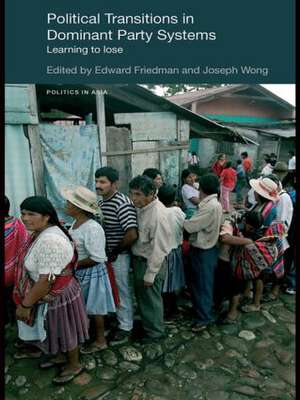Political Transitions in Dominant Party Systems: Learning to Lose: Politics in Asia
Editat de Joseph Wong, Edward Friedmanen Limba Engleză Paperback – 13 oct 2009
Providing historical based, comparative research on issues of theoretical importance, Political Transitions in Dominant Party Systems will be invaluable reading for students and scholars of comparative politics, international politics and political parties.
| Toate formatele și edițiile | Preț | Express |
|---|---|---|
| Paperback (1) | 415.87 lei 6-8 săpt. | |
| Taylor & Francis – 13 oct 2009 | 415.87 lei 6-8 săpt. | |
| Hardback (1) | 1065.06 lei 6-8 săpt. | |
| Taylor & Francis – 15 oct 2008 | 1065.06 lei 6-8 săpt. |
Din seria Politics in Asia
-
 Preț: 384.64 lei
Preț: 384.64 lei -
 Preț: 280.08 lei
Preț: 280.08 lei -
 Preț: 312.09 lei
Preț: 312.09 lei -
 Preț: 311.41 lei
Preț: 311.41 lei -
 Preț: 309.79 lei
Preț: 309.79 lei -
 Preț: 310.51 lei
Preț: 310.51 lei -
 Preț: 281.18 lei
Preț: 281.18 lei -
 Preț: 311.37 lei
Preț: 311.37 lei -
 Preț: 294.01 lei
Preț: 294.01 lei -
 Preț: 191.76 lei
Preț: 191.76 lei - 18%
 Preț: 1059.93 lei
Preț: 1059.93 lei - 18%
 Preț: 1168.37 lei
Preț: 1168.37 lei -
 Preț: 416.44 lei
Preț: 416.44 lei - 18%
 Preț: 1065.06 lei
Preț: 1065.06 lei - 15%
 Preț: 706.72 lei
Preț: 706.72 lei -
 Preț: 445.89 lei
Preț: 445.89 lei - 18%
 Preț: 1011.30 lei
Preț: 1011.30 lei - 18%
 Preț: 1062.62 lei
Preț: 1062.62 lei - 18%
 Preț: 1383.80 lei
Preț: 1383.80 lei -
 Preț: 412.27 lei
Preț: 412.27 lei - 18%
 Preț: 1062.16 lei
Preț: 1062.16 lei - 18%
 Preț: 1004.20 lei
Preț: 1004.20 lei - 18%
 Preț: 1056.32 lei
Preț: 1056.32 lei - 18%
 Preț: 1056.00 lei
Preț: 1056.00 lei - 18%
 Preț: 1055.51 lei
Preț: 1055.51 lei -
 Preț: 412.70 lei
Preț: 412.70 lei -
 Preț: 405.93 lei
Preț: 405.93 lei -
 Preț: 416.96 lei
Preț: 416.96 lei - 18%
 Preț: 1002.68 lei
Preț: 1002.68 lei -
 Preț: 375.97 lei
Preț: 375.97 lei - 18%
 Preț: 700.93 lei
Preț: 700.93 lei -
 Preț: 448.44 lei
Preț: 448.44 lei - 18%
 Preț: 1059.84 lei
Preț: 1059.84 lei - 18%
 Preț: 1058.43 lei
Preț: 1058.43 lei - 28%
 Preț: 823.08 lei
Preț: 823.08 lei - 18%
 Preț: 1002.18 lei
Preț: 1002.18 lei -
 Preț: 394.36 lei
Preț: 394.36 lei - 25%
 Preț: 337.39 lei
Preț: 337.39 lei - 18%
 Preț: 1055.51 lei
Preț: 1055.51 lei - 18%
 Preț: 1057.57 lei
Preț: 1057.57 lei - 18%
 Preț: 1165.73 lei
Preț: 1165.73 lei - 18%
 Preț: 706.28 lei
Preț: 706.28 lei - 18%
 Preț: 1165.73 lei
Preț: 1165.73 lei - 18%
 Preț: 1059.45 lei
Preț: 1059.45 lei - 18%
 Preț: 1056.32 lei
Preț: 1056.32 lei - 18%
 Preț: 1333.14 lei
Preț: 1333.14 lei
Preț: 415.87 lei
Nou
Puncte Express: 624
Preț estimativ în valută:
79.60€ • 86.49$ • 66.91£
79.60€ • 86.49$ • 66.91£
Carte tipărită la comandă
Livrare economică 21 aprilie-05 mai
Preluare comenzi: 021 569.72.76
Specificații
ISBN-13: 9780415559775
ISBN-10: 0415559774
Pagini: 316
Dimensiuni: 156 x 234 x 17 mm
Greutate: 0.45 kg
Ediția:1
Editura: Taylor & Francis
Colecția Routledge
Seria Politics in Asia
Locul publicării:Oxford, United Kingdom
ISBN-10: 0415559774
Pagini: 316
Dimensiuni: 156 x 234 x 17 mm
Greutate: 0.45 kg
Ediția:1
Editura: Taylor & Francis
Colecția Routledge
Seria Politics in Asia
Locul publicării:Oxford, United Kingdom
Public țintă
Postgraduate and UndergraduateCuprins
1. Learning to Lose: Dominant Parties, Dominant Party Systems, and Their Transitions Edward Friedman and Joseph Wong 2. Congress Learns to Lose: From a One-Party Dominant to a Multiparty System in India Susanne Hoeber Rudolph and Lloyd I. Rudolph 3. A House Divided Against Itself: The PRI’s Survival Strategy After Hegemony Frederico Estevez, Alberto Diaz-Cayeros and Beatriz Magaloni 4. Maintaining KMT Dominance: Party Adaptation in Authoritarian and Democratic Taiwan Joseph Wong 5. The Master is Gone, but does the House still Stand? The Fate of Single-Party Systems after the Defeat of Single Parties in West Africa Cedric Jourde 6. The Communist Exit in East Central Europe and Its Consequences Anna Grzymala-Busse 7. Learning to Lose’ is For Losers: The Japanese LDP’s Reform Struggle T.J. Pempel 8. Embracing Defeat: The KMT and the PRI after 2000 Tun-jen Cheng 9. Learning to Lose (and Sometimes Win): The Neocommunist Parties in Post Soviet Politics John Ishiyama 10. Defeat in Victory, Victory in Defeat: The Korean Conservatives in Democratic Consolidation Byung-Kook Kim 11. Learning to Lose, Learning to Win: Government and Opposition in South Africa’s Transition to Democracy Antoinette Handley, Christina Murray and Richard Simeon 12. Learning to Lose? Not if UMNO Can Help It Diane K. Mauzy and Shane J. Barter 13. Singapore "Exceptionalism"? Authoritarian Rule and State Transformation Garry Rodan 14. Why the Dominant Party in China Won’t Lose Edward Friedman 15. Dominant Parties and Democratization:Theory and Comparative Experience Laurence Whitehead
Notă biografică
Edward Friedman is a professor in the Department of Political Science at the University of Wisconsin
Joseph Wong is an Associate Professor of Political Science at the University of Toronto, Canada.
Joseph Wong is an Associate Professor of Political Science at the University of Toronto, Canada.
Descriere
Using country-specific case studies, top-rank analysts in the field focus on the lessons that dominant parties might learn from losing and the adaptations they consequently make in order to survive, to remain competitive or to ultimately re-gain power.


























